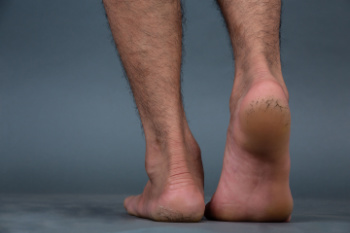
Cracked heels can be uncomfortable and unsightly, and vitamin deficiencies may contribute to their development. Insufficient levels of certain vitamins, especially from the B-vitamin group, can cause the skin to become dry and brittle, leading to cracks. Vitamin B1, also known as thiamine, plays a key role in maintaining healthy skin, and a deficiency can result in rough, cracked skin on the feet. Vitamin B3, or niacin, helps the skin retain moisture and improve its elasticity, preventing cracks. Vitamin B6 supports the body's ability to repair damaged tissues, including the skin, while vitamin B12 is vital for maintaining skin health and preventing dryness. A lack of these vitamins can impair the skin’s ability to stay hydrated and repair itself, making the heels more prone to cracking. If you have developed cracked heels, it is suggested that you contact a podiatrist who can effectively treat this condition.
Cracked heels are unsightly and can cause further damage to your shoes and feet. If you have any concerns, contact Edward Fryman, DPM, FACFAOM from Seaford Foot Care Center. Our doctor can provide the care you need to keep you pain-free and on your feet.
Cracked Heels
Cracked heels appear unappealing and can make it harder for you walk around in sandals. Aside from looking unpleasant, cracked heels can also tear stockings, socks, and wear out your shoes. There are several methods to help restore a cracked heel and prevent further damage.
How Do You Get Them?
Dry skin is the number one culprit in creating cracked heels. Many athletes, walkers, joggers, and even swimmers suffer from cracked heels. Age and skin oil production play a role to getting cracked heels as well.
Promote Healing
Over the counter medicines can help, especially for those that need instant relief or who suffer from chronic dry feet.
Wear Socks – Wearing socks with medicated creams helps lock in moisture.
Moisturizers – Applying both day and night will help alleviate dryness which causes cracking.
Pumice Stones – These exfoliate and remove dead skin, which allows for smoother moisturizer application and better absorption into the skin.
Change in Diet
Eating healthy with a well-balanced diet will give the skin a fresh and radiant look. Your body responds to the kinds of food you ingest. Omega-3 fatty acids and zinc supplements can also revitalize skin tissue.
Most importantly, seek professional help if unsure how to proceed in treating cracked heels. A podiatrist will help you with any questions or information needed.
If you have any questions, please feel free to contact our office located in Seaford, and Bethpage, NY . We offer the newest diagnostic and treatment technologies for all your foot care needs.
